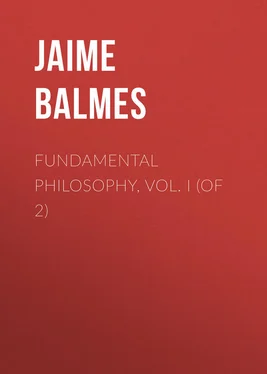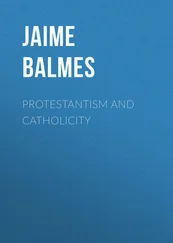Jaime Balmes - Fundamental Philosophy, Vol. I (of 2)
Здесь есть возможность читать онлайн «Jaime Balmes - Fundamental Philosophy, Vol. I (of 2)» — ознакомительный отрывок электронной книги совершенно бесплатно, а после прочтения отрывка купить полную версию. В некоторых случаях можно слушать аудио, скачать через торрент в формате fb2 и присутствует краткое содержание. Жанр: foreign_antique, foreign_prose, на английском языке. Описание произведения, (предисловие) а так же отзывы посетителей доступны на портале библиотеки ЛибКат.
- Название:Fundamental Philosophy, Vol. I (of 2)
- Автор:
- Жанр:
- Год:неизвестен
- ISBN:нет данных
- Рейтинг книги:3 / 5. Голосов: 1
-
Избранное:Добавить в избранное
- Отзывы:
-
Ваша оценка:
- 60
- 1
- 2
- 3
- 4
- 5
Fundamental Philosophy, Vol. I (of 2): краткое содержание, описание и аннотация
Предлагаем к чтению аннотацию, описание, краткое содержание или предисловие (зависит от того, что написал сам автор книги «Fundamental Philosophy, Vol. I (of 2)»). Если вы не нашли необходимую информацию о книге — напишите в комментариях, мы постараемся отыскать её.
Fundamental Philosophy, Vol. I (of 2) — читать онлайн ознакомительный отрывок
Ниже представлен текст книги, разбитый по страницам. Система сохранения места последней прочитанной страницы, позволяет с удобством читать онлайн бесплатно книгу «Fundamental Philosophy, Vol. I (of 2)», без необходимости каждый раз заново искать на чём Вы остановились. Поставьте закладку, и сможете в любой момент перейти на страницу, на которой закончили чтение.
Интервал:
Закладка:
123. This theory may be more or less solid, but it is in either case something more than ingenious; it raises a new problem in philosophy of the highest importance: to assign the conditions of intelligibility. It has moreover the advantage of being in accordance with a fact attested by experience; this fact is the difficulty experienced by the mind in knowing itself. If it is immediately intelligible, why does it not know itself? What condition is wanting? Its intimate presence? It has not only presence but identity. Perhaps the effort to know itself? But the greater part of philosophy has no other end than this knowledge. By denying immediate intelligibility to the soul, we can explain why so great a difficulty is involved in ideological and psychological investigations, by showing the reason of the obscurity experienced in passing from direct to reflex acts.
124. The opinion of St. Thomas is not a mere conjecture: we may, in order to establish it in some manner upon fact, assign a reason which seems to us greatly to strengthen it, and which may be regarded as merely an extension of the one already given.
A thing to be intelligible must have two qualities: immateriality, and the activity necessary to operate upon the intelligent being. This activity is indispensable, for in the act of intelligence, the intellect is in some sense passive. When the idea is present, the intellect cannot but know it: when it is wanting, it is impossible for the intellect to know it. The idea, therefore, enables the intellect to act; without it the intellect can do nothing. Consequently, if we admit that any being can serve as idea to the intellect, we must concede that being an activity to excite intellectual action; and so far we make it superior to the intellect excited.
Thus we explain why our intellect, in this life at least, does not know itself by itself. Experience shows that its activity needs to be excited. Left to itself it is like one asleep; and this want of activity in our mind, in the absence of exciting influences, is one of the most constant of psychological facts.
This is not, however, to say that we have no spontaneity, and that no action is possible without an external determining cause; but only that this same spontaneous development would not exist, if we had not previously been subjected to the influence of causes which brought out our activity. We may learn things not taught us; but we could learn nothing, if teaching had not presided over the first development of our mind. There are, it is true, many ideas in our mind, which are not sensations, and which cannot have emanated from them; but it is equally true that a man, deprived of all his senses, could not think, because his mind would want the exciting cause.
125. We have dwelt thus long upon the explanation of the problem of intelligibility, because we consider it of scarcely less importance than that of intelligence, although we do not find it treated in philosophical works as it merits. We will now reduce this doctrine to clear and simple propositions, so that the reader may form a more complete conception of it; and also, in order to deduce some consequences which have been only slightly indicated in our exposition:
I. A thing must be immaterial in order to be immediately intelligible.
II. Matter cannot be intelligible by itself.
III. The relations of spirits to bodies, or the representation of the latter in the former, cannot be purely objective.
IV. Some other class of relations must necessarily be admitted to explain the representative union of the world of intelligences with the corporeal world.
V. Immediate objective representation supposes activity in the object.
VI. The power of an object to represent itself to the eyes of an intelligence, supposes in it a faculty of acting on that intelligence.
VII. This faculty necessarily produces an effect, and consequently involves a kind of superiority of the object over the intelligence.
VIII. An intelligent being is not necessarily immediately intelligible.
IX. Immediate intelligibility seems to require greater perfection than intelligence.
X. Although not every intelligent being is intelligible, yet every intelligible being is intelligent.
XI. God, who is in every sense infinite activity, is infinitely intelligent and infinitely intelligible by himself.
XII. God is intelligible by all created intellects, provided it be his will to present himself immediately to them, and strengthen and elevate them as may be necessary.
XIII. There is no repugnance in immediate intelligibility being communicated to some beings, which are consequently intelligible by themselves.
XIV. Our soul, while united to our body, is not immediately intelligible, and we know it only by its acts.
XV. In this want of immediate intelligibility is found the reason of the difficulty of ideological and psychological studies, and the obscurity which we experience in passing from direct to reflex knowledge.
XVI. Therefore, the philosophy of the me , or that which seeks to explain the internal and external world by starting from the me , is impossible; it commences by denying one of the fundamental facts of psychology.
XVII. Therefore, the doctrine of universal identity is also absurd, since it gives both intelligence and immediate intelligibility to matter, which can have neither.
XVIII. Spiritualism, therefore, is a truth which springs as well from subjective as from objective philosophy, from intelligence as from intelligibility.
XIX. We must, therefore, go beyond ourselves, and even rise above the universe to find the origin of either subjective or objective representation.
XX. Therefore, we must ascend to a primitive, infinite activity, which places intelligences in communication among themselves and with the corporeal world.
XXI. Therefore, purely ideological and psychological philosophy leads us to God.
XXII. Therefore, philosophy cannot commence by a single fact, the origin of all other facts, but must, and does end with this supreme fact, the infinite existence, which is God. (12) Конец ознакомительного фрагмента. Текст предоставлен ООО «ЛитРес». Прочитайте эту книгу целиком, купив полную легальную версию на ЛитРес. Безопасно оплатить книгу можно банковской картой Visa, MasterCard, Maestro, со счета мобильного телефона, с платежного терминала, в салоне МТС или Связной, через PayPal, WebMoney, Яндекс.Деньги, QIWI Кошелек, бонусными картами или другим удобным Вам способом.
CHAPTER XIII.
REPRESENTATION OF CAUSALITY AND IDEALITY
126. Besides the representation of identity, there is what I have called the representation of causality. A being may represent itself, a cause its effect. Productive activity is inconceivable, if the principle of the productive act does not in some manner contain the thing produced. Therefore we say that God, the universal cause of all that does or can exist, contains in his essence all real and possible beings in a virtual or eminent manner. A being can just as well present whatever it contains in itself, as it can represent itself; causality, therefore, under the conditions above explained, may be an origin of representation.
127. And here we would remark how profound a philosopher St. Thomas shows himself to be, when he explains the manner in which God knows his creatures. In his Summa Theologica , 7 7 P. 1a, Q. 14a, A. 5o.
he asks if God knows things distinct from himself, and answers in the affirmative; not that he regards the divine essence as a mirror, but that by recourse to a more profound consideration he seeks the origin of this knowledge in causality. This is his doctrine in a few words: It is manifest that God knows himself perfectly; therefore he knows all his power, and consequently all the things to which it extends. Another reason, or rather enlargement of the same reason, is, that the being of the first cause is its intellect: all effects pre-exist in God as in their cause; they must, therefore, be in him in an intelligible manner, since they are his intellect itself. God then sees himself by his essence; but he sees other things not in themselves, but in his essence, inasmuch as his essence contains the similitude of everything.
Интервал:
Закладка:
Похожие книги на «Fundamental Philosophy, Vol. I (of 2)»
Представляем Вашему вниманию похожие книги на «Fundamental Philosophy, Vol. I (of 2)» списком для выбора. Мы отобрали схожую по названию и смыслу литературу в надежде предоставить читателям больше вариантов отыскать новые, интересные, ещё непрочитанные произведения.
Обсуждение, отзывы о книге «Fundamental Philosophy, Vol. I (of 2)» и просто собственные мнения читателей. Оставьте ваши комментарии, напишите, что Вы думаете о произведении, его смысле или главных героях. Укажите что конкретно понравилось, а что нет, и почему Вы так считаете.












